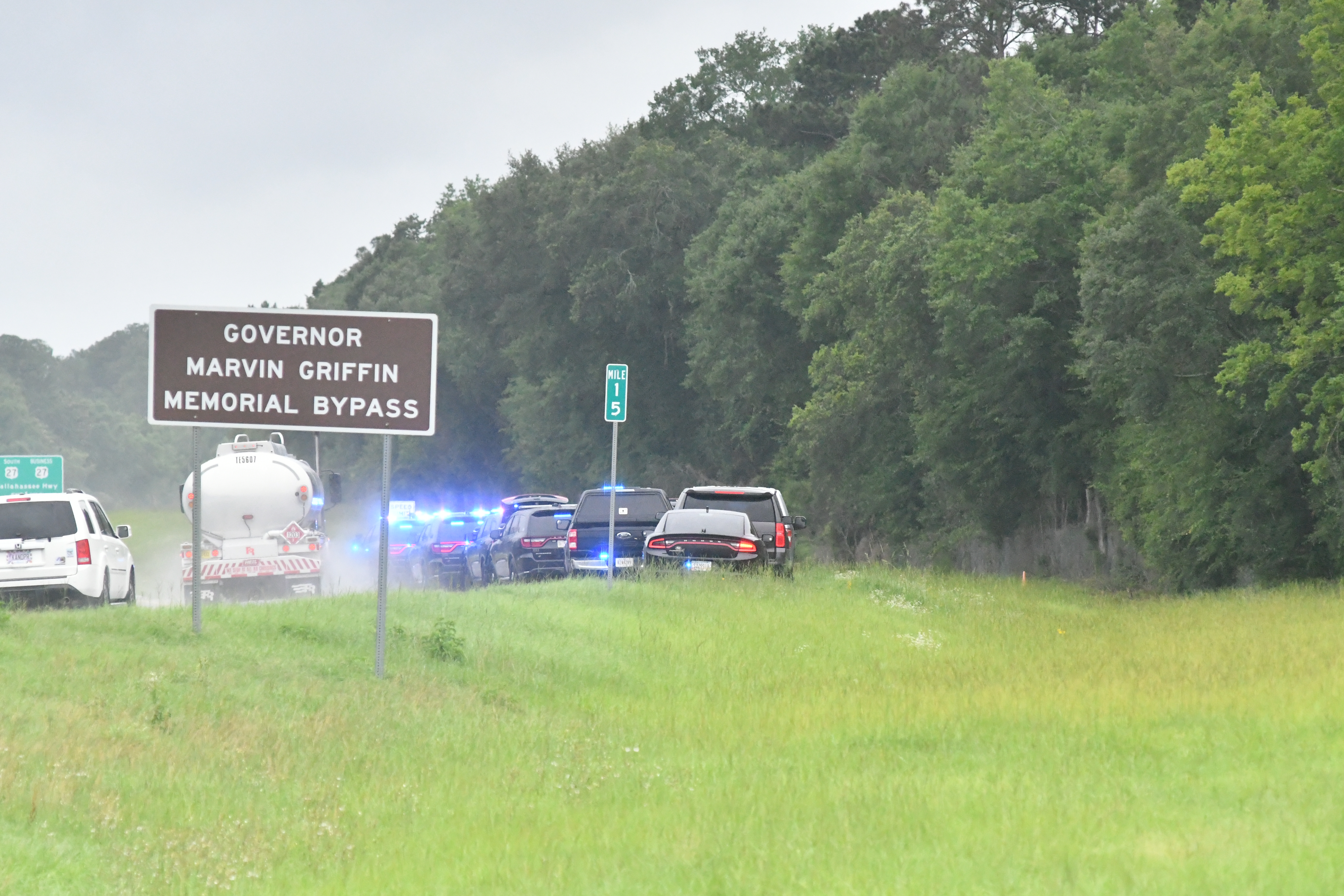Decatur and Grady Counties look at updating radio system
Published 7:22 pm Friday, January 15, 2016

Bainbridge Public Safety Fire Chief Doyle Welch uses his department issued radio. The system is shared by agencies in Decatur and Grady Counties including BPS and the Sheriff’s office. — Brandon O’Connor
“I’m standing there with a 12-gauge pointed at this man ready to do what I have to do to save my and my partner’s life,” Grady County Sheriff Officer T.S. Poitevint said.
Just after 1 a.m. on Dec. 26, 2014, Cpl. Poitevint and his partner responded to a 911 call from a woman who had been attacked by her husband.
Cpl. Poitevint, along with his partner Sgt. Jake Bush and Staff Sgt. Larry Jowers, accompanied the woman to her house to help her retrieve her possessions.
“We went there just to talk to this man, to see if we could get her property and pets,” Poitevint said. “We arrived on the scene and [Bush and I] told our sergeant to stay about 200 yards across the property from us with the female.”
Robert Thomas, the victim’s husband, came to the door very drunk and irate according to Poitevint.
“You knock on my door again I’ll kill you,” Thomas yelled after slamming the door on the officers.
The officers then retreated from the house while yelling into their radios for help from Jowers, who was only at the end of the driveway.
“We started calling out for help,” Poitevint said. “I called out nine times and could not get help. My sergeant never heard me.”
The radios that Poitevint and Bush had been issued failed them just as they needed them. Poitevint, with his department issued 12-gauge shotgun in hand, and Bush, with his Taser drawn, approached the house again.
Thomas exited the house once again and Bush fired the Taser at him, but missed. As Bush reloaded, Thomas approached the officers with his hands raised ready to attack according to the incident report.
“The whole reason I didn’t shoot this man was he was unarmed,” Poitevint said. “I was squeezing the trigger.”
Bush’s next attempt with the Taser was successful and the officers were able to arrest Thomas. Poitevint said if the radios had worked they would have been able to receive help and wouldn’t have been forced to make additional contact with Thomas on their own. They had no choice though
“We had to secure the scene,” Poitevint said.
The joint Decatur-Grady Counties 911-commission switched over to the current VHF radio system on Oct. 1, 2013. This followed a four-year process that started after the Federal Communication Commission (FCC) mandated that public safety radio systems be narrow banded by Jan. 1st, 2013 (the 911-commission received two waivers enabling them to implement the system after this date). The system is used by Decatur and Grady County emergency services, the Decatur County Board of Education, and the cities of Attapulgus, Bainbridge, Climax, Cairo and Whigham.
Now, two years and $3.5 million later, Decatur and Grady Counties are working with Motorola on a new 700 MHz system because problems have consistently plagued its current system.
On the system that was in place prior to 2013 the different agencies would hear voices from elsewhere seeping into the system as frequencies overlapped. The interference is still present in the new system, but the technology reacts to it differently.
“The problem is that the nature of the new technology is that it is intuitive enough that when it senses that interference is coming in it shuts that channel down,” Motorola representative Glenn Hendry said at the Decatur County Board of Education meeting on Dec. 17, 2015. “The VHF that you are using, that is the spectrum that they started deploying in 1962.”
According to 911 Director Tonya Griffin, this interference can come from a variety of sources including other agencies or devices that use the same VHF technology as the radios.
“It was last year about this time we ended up getting two Motorola system techs down [to Grady County] and eventually found it was a remote garage door opener that was causing interference where they couldn’t even talk in their building,” Tonya said.
The majority of the problems occur in Grady County as they receive interference from agencies in Alabama.
“It’s going to windup getting someone really hurt or killed,” Grady County Sheriff Harry Young said.
In 2009, when the process of implanting a new radio system that met the narrowband mandate started, the 911-commission was given the option of tying into the Tallahassee/Leon County 800 MHz system. The total cost to join the system was $6.5 million.
“Grady had money concerns and 800 MHz was expensive,” Bainbridge City Manager Chris Hobby said. “It started with a very vendor driven process. People had problems with the vendor saying what to do.”
Instead of going with Motorola’s proposal to tie into the Tallahassee/Leon County system, the 911-comission hired RCC Consultants to determine the best system for Decatur and Grady Counties. RCC was hired in July of 2010 and later presented a proposal with eight different radio options.
The proposals ranged from meeting the bare minimum required by the FCC to a top of the line 700/800 MHz trunked system. RCC recommended that Decatur and Grady counties go with a digital narrow banding VHF system.
The original recommendation includes a notation that VHF systems are “notoriously problematic” concerning interference and that Grady and Decatur have reported interference “from a site located over 100 miles away.”
“I was in the committee meeting, and they said these are your eight options and this is the one that you picked,” Tonya said.
This was after Motorola warned the commission that they were going with an outdated system.
“I remember the meetings,” Tonya said. “Motorola stood up and said ‘don’t put new technology on old frequencies’. One of the analogies that was made was that we put a new motor in a 1990 Ford.”
According to Decatur County Commission meeting minutes from 2010-12 there was little to no discussion about the different proposals before the commissioners voted on May 31, 2012, to implement the VHF system.
“I think Carl [Rowland] drove the train. That was my impression,” Hobby said. “Carl was the one that made these decisions. It was his show.”
According to Tonya and Sheriff Wiley Griffin, their impression was that the importance of selecting the correct radio system to meet the needs of public safety was overshadowed by Decatur County’s focus on Main Street Broadband, now known as Turner Broadband.
“The radio they picked was the cheapest,” Wiley said. “Was more about getting broadband than proper radios. [Rowland] should have called me and said these are the radios we chose, and he didn’t.”
Now that decision is putting emergency personnel throughout the two counties at risk.
“Cutting corners is going to cost somebody a life,” Grady County Sheriff Harry Young said.
The original proposal from RCC called for three tower locations in each county. The three proposed locations in Decatur County were at the sheriff’s office, the landfill and on Highway 97 South near Faceville.
“The tower should have been built in Attapulgus,” Wiley said. “I asked why the tower was going at the landfill, and the consultant said that wasn’t the best place, but that was where Carl wanted it.”
The final proposal that was implemented by Motorola only required two towers with the tower at the landfill being removed. Placing a tower on Highway 97 and/or the landfill minimized the amount of radio coverage in Attapulgus, but maximized the broadband coverage in southern parts of the county.
“I wanted that tower down at the landfill to serve both, but the consultant said that wasn’t the best place,” Carl Rowland, who was Decatur County finance director at the time, said. “I was trying to kill two birds with one stone.”
The tower at the Decatur County Sheriff’s office, which used to be only for the public safety radio system, now has broadband Internet transmitters installed on it as well.
“The way that we got to this point, I don’t think it was with public safety being the priority,” Tonya said.
When asked if she thought they went with a cheaper radio system in order to afford broadband Tonya answered “Yes”, that is what happened.
“That is absolutely not true,” Rowland said. “They might blame a lot on me because I’m not here anymore, but I’m not going to let them.”
Now two years later, the 911-commission is being forced to implement another new system.
“I remember the conversation that we don’t want to spend a lot of money and be sitting here again in five years,” Hobby said.
The current system was designed by RCC, but implemented by Motorola, which minimized both parties’ liability for future problems. This time Motorola is both designing and implementing the system.
“The difference is that this time if Motorola tells us, ‘you’re going to have coverage in the southern part of the county’, and we don’t, Motorola is going to have to come in on their dime and fix it,” Tonya said.
The current proposal is to go with a 700 MHz system that will use the same towers as the current system.
“This is a monkey on Motorola’s back and they want it off desperately,” Hendry said at the BOE meeting on Dec. 17, 2015. “They are calling it a ‘pass through.’ They are doing this at cost.“
Hendry said that in all his years with Motorola he has never seen them do this before. They are also selling the radios at a 50-percent discount instead of the normal 25-percent discount.
For the new system, Decatur and Grady counties will split the infrastructure costs with an estimated total price tag of just over $1.5 million. The other agencies will then have to buy their equipment and pay a yearly subscriber fee to use the system.
The total estimated cost for Decatur County including its share of the infrastructure and the purchase of radios is just over $1.5 million. The City of Bainbridge’s estimated cost is just over $220,000 and the Board of Education’s is just over $290,000 (these numbers are subject to change after the number of radios is finalized).
Due to Motorola’s cost cutting, the final combined costs for the 2013 and 2016 upgrades should roughly equal what it would have cost to originally implement a 700/800 MHz system.
According to Grady County Commissioner T.D. David, Grady County is expected to vote on the new system in the next couple of weeks. Chris Hobby said he expects that the City of Bainbridge will officially adopt the proposal at their next meeting on Jan. 19. Decatur County and the Board of Education are expected to vote in the near future, but a date has not been determined.
“I couldn’t imagine us being on a different frequency from Public Safety or the Sheriff department if something went wrong,” Bobby Barber, a Decatur County School Board member, said.
Any agency that decides not to approve the new plan will be responsible for implementing its own system. They will also be unable to talk to anyone outside of their agency. After all parties vote, the new system will then take 12-18 months to implement.






